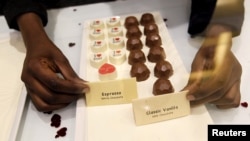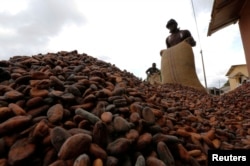Jaki Kweka is that rare breed of gourmet chocolatier. She makes fine chocolate in Africa using local African ingredients.
Other African companies such as Ghana's Golden Tree use local cocoa but import milk powder and sugar. Multinationals such as Nestle mass-produce chocolate in South Africa for the continent's consumers and source ingredients globally.
But few firms match Kweka's ideal — she uses Tanzanian beans and local sugar to make organic chocolate that is 100 percent African. She packages her bars in recycled maize husks for extra authenticity.
Kweka's Chocolate Mamas is one of a handful of East African firms carving out a niche in the chocolate world and seeking to reverse a trend that has led to the foreign domination of Africa's growing chocolate economy.
The firm employs five people and its small size sheds light on a big issue: Africa produces more than 70 percent of the world's cocoa but the $110 billion chocolate industry is dominated by Western companies.
Top cocoa producers Ivory Coast and Ghana lack dairy and sugar industries to compete with the main manufacturers and cocoa is traded globally, so African bean growers don't have a competitive advantage when it comes to making chocolate.
“You don't really find large-scale chocolate manufacturing [by African companies] in sub-Saharan Africa because it's not commercially viable. It's expensive to produce,” said Victoria Crandall, an Ecobank analyst in Ivory Coast.
Chocolate Mamas' dark and milk chocolate bars sell at premium prices in high-end shops and hotels in Dar es Salaam and Zanzibar, and they have a devoted following among wealthy Tanzanians, expatriates and tourists.
The company launched in 2012 and Kweka began using cocoa from small-scale farmers in southwestern Tanzania after seeing the price of importing baking chocolate from Europe. It took nine months of trial and error to perfect recipes.
“We found out a lot of things, including that heat and humidity don't go very well with making chocolate,” said Kweka, a lawyer turned pastry chef.
A few months ago she and her business partner opened a store at an upmarket shopping plaza in Dar es Salaam with views of the Indian Ocean.
“There is so much unexhausted potential for making things that are not on the market here,” she said.
Absolute Chocolate
Chocolate consumption in sub-Saharan Africa is on the rise. Sales in South Africa, the continent's largest market, rose to 6.4 billion rand ($531 million) in 2014 from 5.8 billion rand in 2013, according to market research firm Nielsen.
South Africa, which does not produce cocoa on a large scale, is the continent's biggest chocolate producer. Aside from Nestle, Mondelez and Lindt also have factories.
The most prominent mass-market chocolate maker in West Africa is Ghana's Cocoa Processing Company, which makes around 1,000 tons of chocolate per year under its Golden Tree label.
Street hawkers sell the bars, some for less than a dollar, and they contain an ingredient to stop melting in the hot sun.
Golden Tree serves a domestic market and has yet to export its products successfully. On that score, Africa's most successful wholly local chocolate brand may be Madecasse, a company founded in Madagascar in 2006.
Peace Corps volunteers established it to help farmers make money from the island nation's coveted cocoa and vanilla. Its idealistic origins are a key to its success and an indication of how tough it is to drive an African chocolate business.
The bars, which cost $6, sell at Whole Foods and other gourmet food outlets in the United States, though they are not on sale yet in their country of origin where the price could limit their appeal.
“We have ambitions to scale considerably but for us it's always a question of getting the right ... investors,” said Tim McCollum, a founder and CEO of Madecasse who is based in New York.
In Kenya, Naheed Ahmed started Absolute Chocolate in November soon after getting his first taste of fine chocolate at culinary school in South Africa.
He now makes 100 kilograms a month, selling his chili-infused truffles from under glass cases at a shop made to look like a jewelry store in Nairobi's upscale Village Market.
His nearby factory shows how distant is the dream of an all-African chocolate bar: The machines are Italian, the praline molds come from Belgium and the sea salt comes from England.
The cocoa comes from Ghana, however. It's virtually the only African input.






